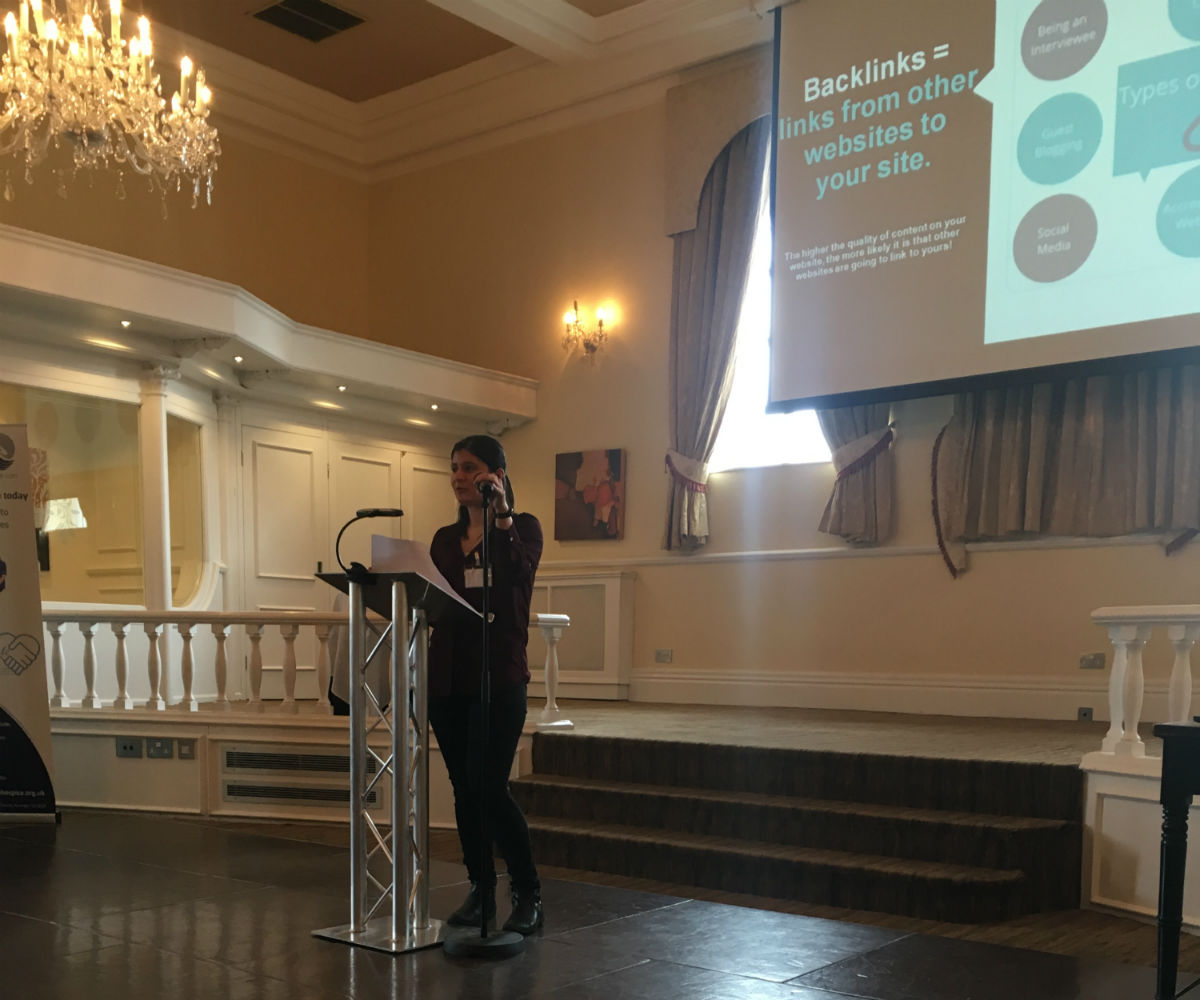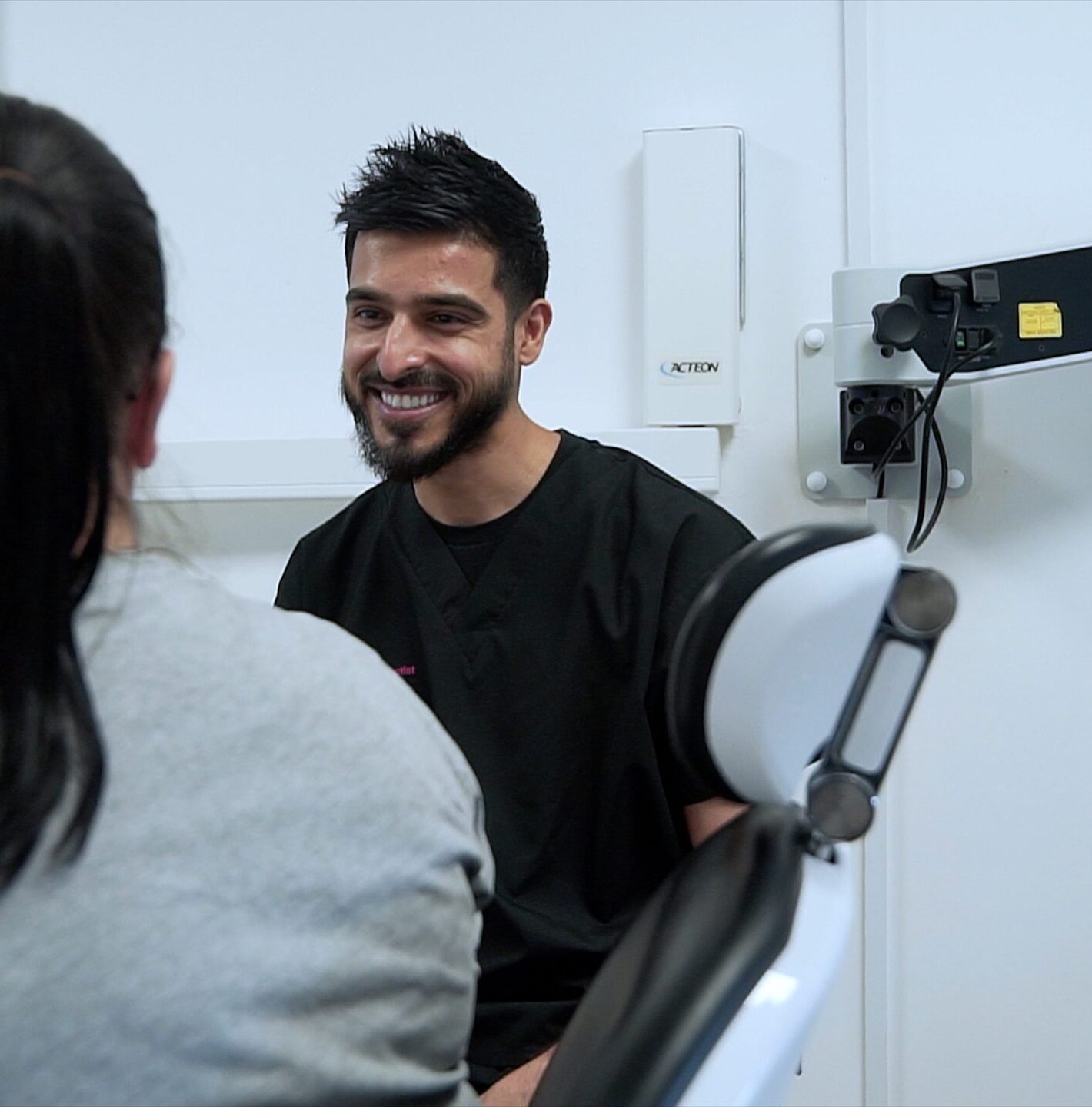Following on from Part 1 of our How to Improve your Website Ranking in 2019 Guide, here’s the SEO Content Writing insights our Social Media Coordinator and Copywriter Jayna Patel shared as Pivotal presented at Overgate Hospice’s Corporate Member’s networking lunch in March.
E-A-T – The Quick SEO Win
Before we share with you what the audience at the Overgate Hospice Corporate members lunch learnt, here’s a quick video of Jayna sharing Google best practice E-A-T that should, if followed, help your website reap the SEO awards.
In 2018 Google announced a new “core-update” to the algorithm but, just before doing so, they updated their Quality Rater Guidelines with a focus on E-A-T. Google’s Quality Rater Guidelines are a set of criteria that Google’s search quality team use to establish the quality of the websites that appear in the search engine results. E-A-T has made up a large part of the search engine giant’s guidelines for years but concentration on the importance of E-A-T was renewed in the 2018 update.
What is E-A-T?
E-A-T stands for:
- Expertise
- Authoritativeness
- Trustworthiness
How Do I Conquer E-A-T for My Website?
- Authenticity – As a search engine, Google wishes to showcase content written by experts so make sure your webpage content and blog posts are written by someone who is an expert in the product or service or subject they’re writing about! Avoid hiring random freelance copywriters to create your content – Google will be able to tell you’re not being authentic or credible (it’s clever that way).
- Transparency – Having a detailed ‘About Us’ webpage containing information about your company, an easily located Contact page, links to external sources used in blog posts and a clear Privacy Policy and Terms of Service will all help Google verify your website’s credibility and expertise.
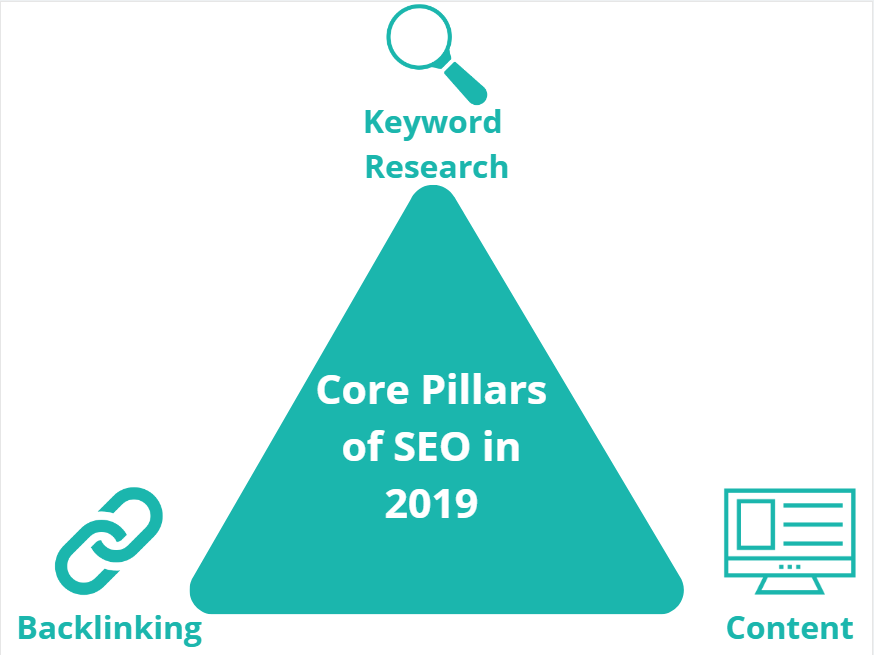
The Core Pillars of SEO in 2019
 Once you’ve grasped SEO basics, you can then put these SEO content writing insights into practice. Let’s dive into what Jayna would recommend…
Once you’ve grasped SEO basics, you can then put these SEO content writing insights into practice. Let’s dive into what Jayna would recommend…
Keyword Research
How do you know which keywords you should be aiming your website to rank highly for? (CLUE: you shouldn’t just assume you know what your target market search for.) You should always carry out keyword research before creating a new blog post or webpage for your website…otherwise it’s a bit like a stab in the dark!
A good start is to have a look at what your Digital Competitors are blogging about. (By Digital Competitors we mean, not companies you think of as your rivals, but rather those that rank above your website ranking in search results.) What words do they use in their Meta Descriptions and Blog Post Titles? Doing this should give you inspiration (rather than copying!).
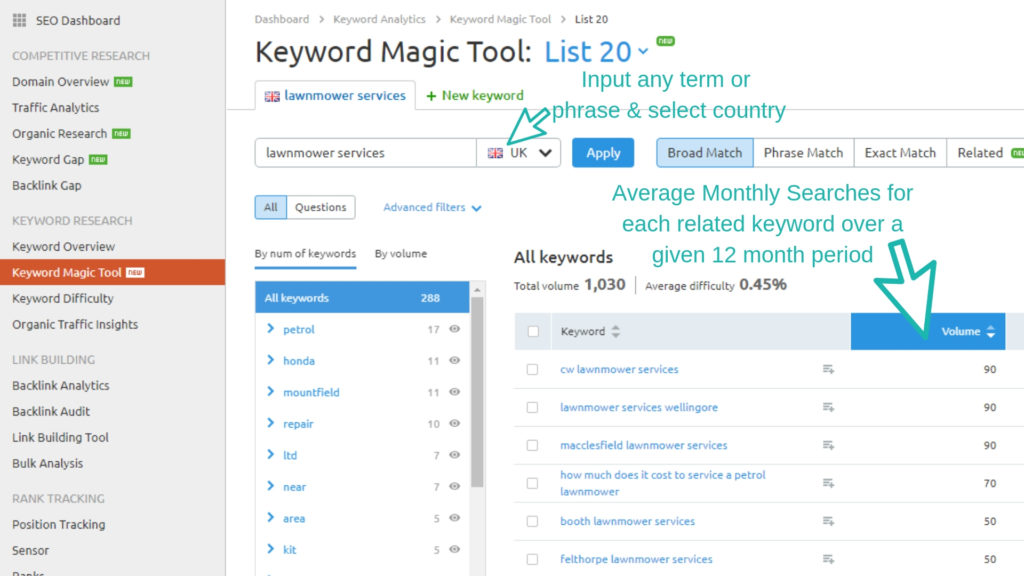
If you would like to step things up to a more advanced level, SEMRush’s Keyword Magic Tool works wonders (again, SEMRush is a paid-for platform often used by Digital Marketing agencies like ourselves – you can view their prices here). The tool allows you to see the most searched for keywords for a given country.
Content & Why It’s So Important for Your Website!
A website should never be seen as static and considered ‘done and dusted’ once it’s built. Instead, view it as an ever-evolving and expanding asset for your business.
Your website needs nurturing by being kept up-to-date with engaging content. Here’s why:
- Credibility – Writing about what you know about adds authenticity to your website. (Remember Google’s focus on E-A-T and expertise that we talked about at the beginning of this post?!)
- Compelling – Sharing tips, best practice, real-life stories and insights regularly gives visitors a reason to keep returning to your website. Plus, if your content is engaging and interesting it gives them a reason to stay on your website for longer – increasing Dwell Time (see Part 1 of our ‘How to Improve Your Website Ranking in 2019’ guide) and improving your Website’s Bounce rate (again, see Part 1). This is because if you have written one brilliant blog post, a reader is more likely to want to explore more pages and posts on your website as they’ll be hungry for more!
- Opportunity – Helpful content is a great way to showcase your experience, knowledge, work and success and build a positive online reputation to an engaged audience.
- Pleases Google – Content that increases your Dwell Time, lowers your Bounce Rate, provides opportunities for backlinks (links to your website) and external links (where you link out to other sources) and increases your Click-Through-Rate (enticing people to click on your link in search results) all works to keep Google and other search engines happy.
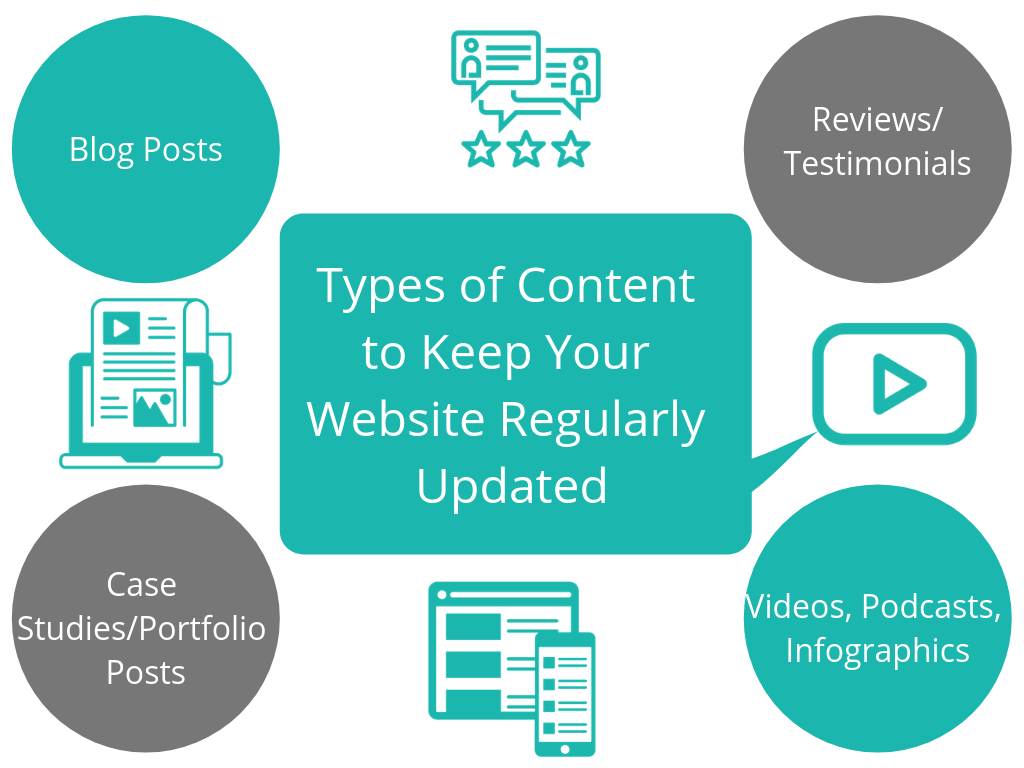
Types of Content You Can Publish
Content creation is a chance to get creative!
- Blog posts can be a great way of conveying a lot of insightful information that your audience/customers will benefit from.
- Customer reviews and testimonials serve as great content – people are bound to trust what other people like them say about your business over you overselling yourself any day!
- Case studies and portfolio posts reveal how your business made life easier for a customer through real-life examples and storytelling. They allow your work to speak for itself.
- Videos, podcasts and infographics (visuals and diagrams) make content more dynamic. They appeal to more visual and auditory learners. However, we would always advise including supporting text to give the multimedia context and explain what it is about.
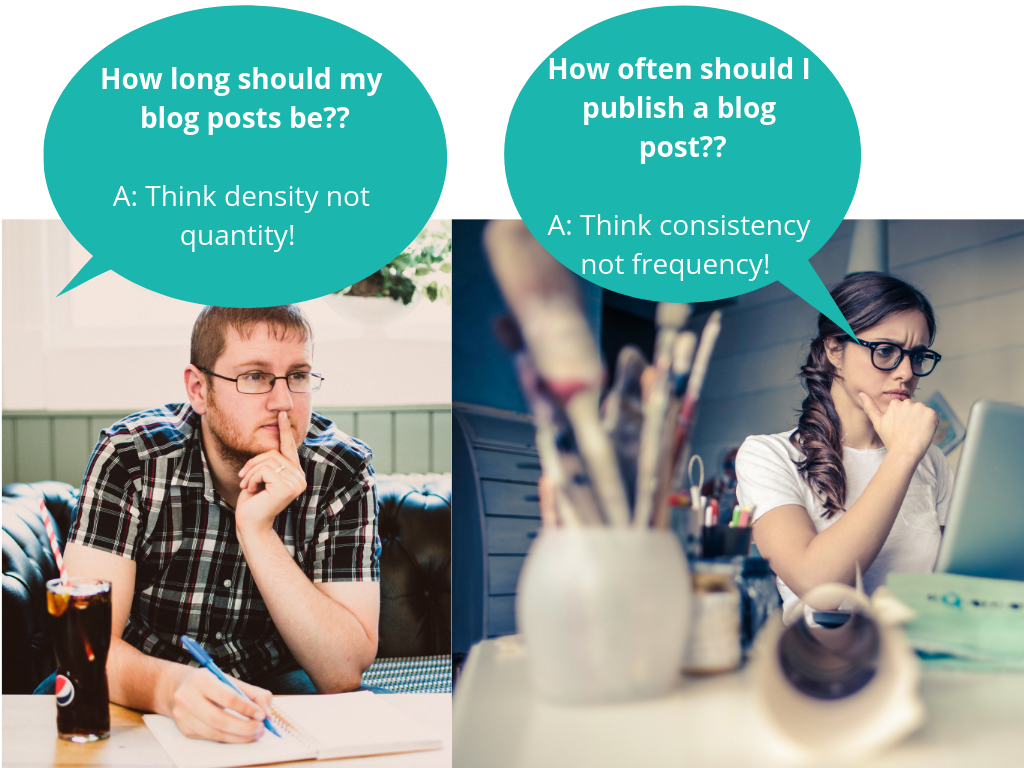
How Often Should I Blog and How Long Should My Posts Be?
If the above question is something you stress about, don’t worry!
Avoid writing words for the sake of it. Instead, aim to share valuable content that keeps your readers engaged and interested. Lengthy content is more likely to encourage visitors to stay on your webpage for longer (which is better for your website’s Dwell Time) so we advise making blog posts at least 300 words. Some experts argue that longer-form content of around 1500-2500 words has better SEO traction but DON’T feel obliged to hit a certain word count.
Avoid overstretching yourself and getting bogged down with daily blog posts. No one has time for that, we’re all busy! Instead, remain consistent about how often you publish blog posts. We would suggest publishing a blog post/case study/portfolio post at least once a month. This would keep your website fresh and give visitors a reason to return.
What Should You Blog About?
“Who would be interested in what I have to say?”
You might have asked yourself the above question often, but the truth is there are lots of things you could blog about. For instance:
- Answer the questions your customers often ask – this will help with ranking for Featured Snippets and Voice Search (see Part 1). You’ll know what they ask as you’ll answer their enquiries on social media, email and the phone every day!
- Share top tips and insights that solve people’s problems.
- Give your opinion on industry news – this will cement your reputation as a ‘thought-leader’ or the go-to person on your field of expertise.
- Share your company news – has your company sponsored a local event, attended an exhibition or won an award recently? Your customers will want to know!
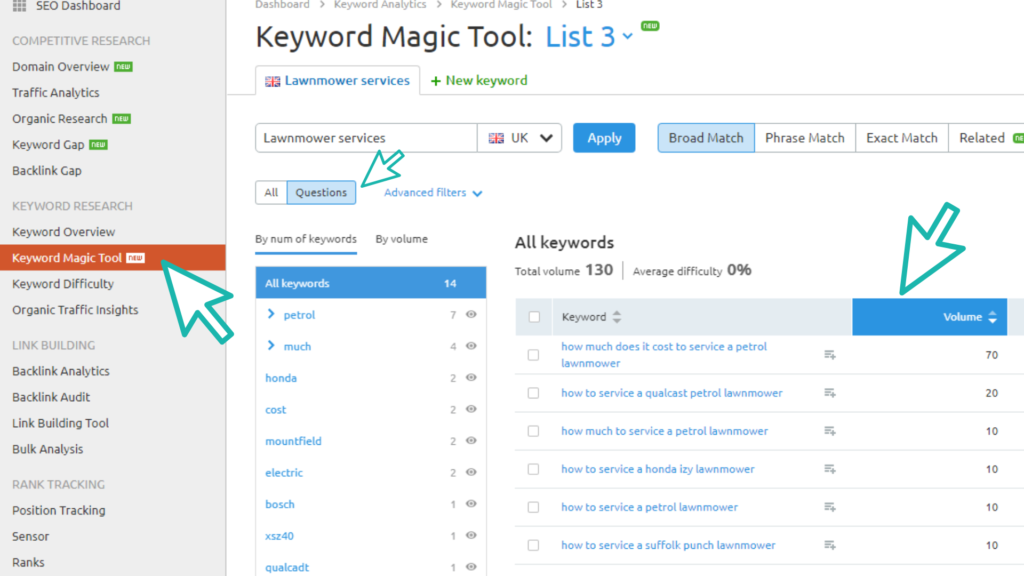
Pro Tip: If you want to be super clever, the ‘Questions’ tab on the SEMRush’s Keyword Magic Tool tells you which questions related to a given keyword get the most searches on average per month online. If you tailor your blog posts to answer those questions, you’re onto a winner!
Backlinking – What Is a Backlink and How Do I Get Them for My Website?
Backlinks are links from other websites to your site. Lots of good quality backlinks from websites with a high Domain Authority can contribute to helping increase your Website Ranking. Backlinking can be hard work but it pays off in the end!
The higher the quality of the content on your website, the better the chances of readers being impressed and wanting to link to your brilliant blog post or webpage.
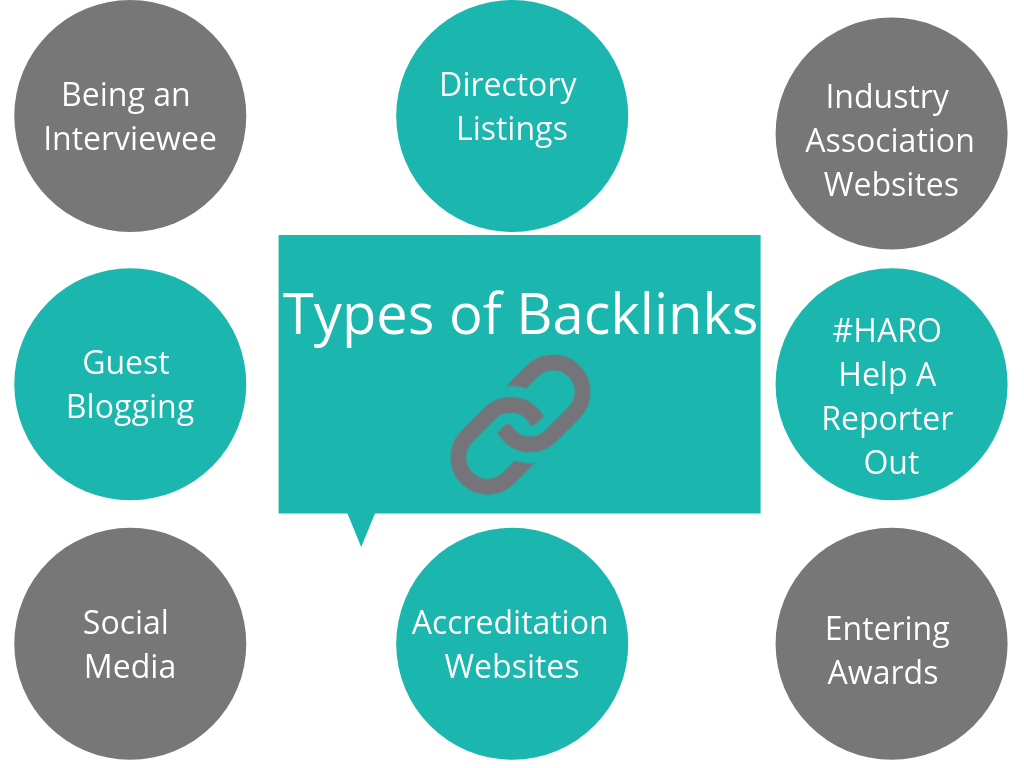
- Being an Interviewee – Everyone is an expert at something. You’re an expert at something. Allowing yourself to be interviewed by a leading industry publication is bound to secure you a link back to your website from that publication’s website!
- Directory Listings – We established in Part 1 of this guide that some people may click on Directory Listings in search results first. Contacting the people who manage directories is quick and easy too.
- Industry Association Websites – If you’re a builder who is a member of the Federation of Master Builders for example, and they list their members on their website, don’t miss the opportunity to secure a link back to your site!
- #Haro Help A Reporter Out – Journalists sometimes use this hashtag on Twitter, when looking for a quote from experts (or local business owners) for a story they are writing. Contributing may earn you a link back to your website.
- Entering Awards – If you’ve spent the time and effort on an award submission and you’re lucky enough to win or be shortlisted, the awards website is likely to link to your website from theirs.
- Accreditation Websites – Accreditations don’t just reassure your potential customers, they can be a brilliant source of backlinks too! For instance, as a contractor, you may be a Which? Trusted Trader.
- Social Media – As well as being brilliant at raising your brand awareness and driving traffic to your website, many social media platforms offer the chance for you to input your website URL into the bio or ‘About’ section of your profile.
- Guest Blogging – This method of backlinking is a bit trickier as another website has to agree to publish your content. However, if you find a website that has a similar target audience to you but isn’t a direct competitor you increase your chances of being published. You’re an expert, after all, so your knowledge will be in demand!
This article is a brilliant read about how to secure backlinks WITHOUT Guest Blogging.
Congratulations! You have reached the end of our Guide on Improving your Website Ranking in 2019!
Still seems a bit too technical? Why not give us a call to find out how we could help boost your website’s ranking? We know our stuff after all!

